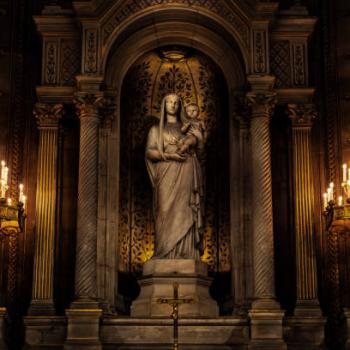
Ten years ago this week, I got married. Before my wedding day, though, I went to the movies with my mom, to see the December 2012 release of Les Misérables, the latest cinematic version of the 1980 musical that is based on Victor Hugo’s 1862 novel. Les Misérables is about the trials and triumphs of the heroic ex-convict, Jean Valjean, who breaks his parole and then spends an exemplary life running from the overzealous detective, Javert. It is set in mid-nineteenth-century France, against the backdrop of the revolutionary period—when the rich get richer, the poor get poorer, and a group of young idealists tries to overthrow the government in an attempt to remedy this gross disparity between classes.
Like the movie critics, my mom and I gave the film a very mixed review. Russell Crowe’s Javert, in particular, performs a dogged earnestness that borders on the unintentionally comical.
In December 2012, as I said my vows, I could not have predicted many things about the next ten years. Among the least likely things that has come to pass, though, is that I have returned to that mediocre musical so many times—and listened to the soundtrack so many more—because my children (for whom I do fast forward through the raunchy scene on the docks, given their tender ages) can’t get enough of it.
Our family’s fascination with Les Misérables began when I unthinkingly played the soundtrack in the car about three years ago, when my older sons were five and three. The three-year-old, in particular, asked endless questions to understand the context and characters in the songs. Then, he asked almost every day to hear the soundtrack at home. So, I bought picture books and a short chapter book, each of which I read to him and his big brother many times. Eventually, as his questions went beyond the scope of the children’s books, and tried to connect the songs to the story, I told him that there was a grown-up book that he could read one day and also a movie, which we could watch when he was older. After a month of being asked about it every day, we watched the film.
Faith and reason in Les Misérables
When my husband and I watched the movie through our kids’ eyes, we noticed that the film (its artistic and cinematic limitations aside) portrays in one compelling, complex, and adventurous story a great deal that we want our boys to understand about the familial, cultural, and political world.
The novel, Les Misérables, is 160 years old, and the musical is 32 years old. But Jean Valjean’s story, and the stories of those around him, offer more instruction about how to understand the living of our Catholic faith in the fallen, modern world of today than I can synopsize here.
But, at risk of oversimplification, I do share these four lessons from Les Misérables about faith and reason (and about today’s excesses of each unto a rejection of both).
Reason without faith is cruel—so beware the excesses of the right.
Inspector Javert, who is a detective following the letter of the law, shows no mercy toward others, and offers no understanding for the humanity of anyone that does not follow the law in full. This means that true justice—for which he ostensibly labors in vain to capture the do-gooding Valjean, who was imprisoned for 19 years after stealing a loaf of bread to keep his sister and her child from starvation—is beyond him as well. Yes, the letter of the law is on Javert’s side. But laws that imprison the starving unto death are not laws that any truly God-fearing person should abide, much less enforce.
Javert is the original “just pull yourself up by the bootstraps” conservative, made all the more zealous by the feeling that what he is demanding of others is no more than he has done himself. Javert is “from the gutter, too,” just like many of those he pursues. But, of course, some people do not have the resources—health, intelligence, and so on—that he clearly must possess to “choose his way” into respectable society. There can be, after all, no bootstraps without boots.
Ultimately, of course, Javert is self-loathing. When Valjean shows him mercy instead of killing him, he commits suicide. He cannot abide a world with any liminal space between right and wrong. He would rather die himself than have to consider anything so subjective as context. And in committing suicide for that reason, Javert also reveals that he is, underneath his elaborate pretenses, less concerned with his continued service to the law than with the law’s supposed failure to serve him.
Those of us with an impulse toward reason that eschews faith—mostly, those identified with the right and heedless of its excesses in comparison to those of the left—would do well to consider whether we really want to condone, support, or partake in the self-righteous cruelty of Javert.
Faith without reason is equally cruel (and more seductive)—so, beware the excesses of the left.
The idealistic, educated, upper-class young men that seek to liberate French peasants from the established order that elevates the merciless Javert—and to do so in one swift revolution, with as little consideration of the broader context as Javert himself brings to bear—are the conservative detective’s progressive counterparts. They will not accept change that is iterative and incremental, rather than sudden and totalizing (ostensibly because any remnant of the old order, with its vast and deep inequalities, would be immoral).
The fact that the peasants, on whose behalf these young men allegedly labor, are not themselves willing to upend everything at once such that “we [the young men] are abandoned by those [the peasants] who still live in fear”—in part because the peasants are not a monolith, but have specific interests, livelihoods, and fears that their would-be saviors have made no attempt to understand (much less share)—is immaterial to the young men. Yes, Christian mercy necessitates changing the status quo, as the young men seek to do. But alleged mercy that flouts law and order with presumptive violence—such that it makes potential cannon fodder of even the helpless women and children it seeks to liberate—is not a kind of mercy that any truly God-loving person should abide, much less instigate.
The young men are the original limousine liberals, and virtue-signalers. They are made all the more self-righteous by the fact that they are willing to die, ostensibly to free their socioeconomic inferiors. But, of course, many of those socioeconomic inferiors are not themselves willing to die for the sake of future peasants’ prospects and/or posterity. Their young would-be liberators would know this if they knew any peasants. But they don’t.
After all, to know any peasants would require spending less time sitting around together drinking wine (without, unlike most people of both the peasant and the upper classes, any real familial or societal responsibility) in solipsistic awe of the alleged heroism of their self-imposed martyrdom. Their idealism is not about “doing the work.” It is, as in the case of most idealists that claim to be “doing the work,” ultimately about avoiding work. Because real work involves context and compromise—which, just like Javert, the young men shun in favor of personally satisfying absolutes.
Those of us with an impulse toward faith that eschews reason—mostly, those identified with the left and heedless of its excesses in comparison to those of the right—would do well to consider whether we really want to condone, support, or partake in the unwitting cruelty of the young revolutionaries.
In this fallen world, pure selfishness often prospers—so, beware the liars, criminals, and cheats.
Monsieur and Madame Thenadier are the embodiments of selfishness, criminality, and venality. The inn-keeper and his wife abuse children, steal from unsuspecting guests, and manipulate any person or system that they can for their own gain. They are criminals not by circumstance, but by choice. By victimizing others, they prosper both monetarily and emotionally. They are gleeful in their criminality, not resigned to it. They are not like Valjean (who attempts to steal from the priest that takes him in, before repenting and living a life of service to the less fortunate) or Fantine (the abandoned woman who becomes a prostitute to pay her child’s medical bills).
As his own dealings with them show, the mercy and understanding that Valjean so generously bestows upon others would be wasted on the Thenadiers. Valjean knows better than to cast his pearls before swine, and he is too discerning to expect that these two are or will be anything else.
To love well is to honor both faith and reason—so, cultivate love that seeks truth.
Valjean is a hero because he attempts to save Fantine’s life, adopts her child, and tirelessly serves the poor and marginalized that an ungodly, harsh societal order treats as unworthy of justice, let alone of mercy.
“To love another person is to see the face of God,” proclaims Les Misérables. Valjean sees the face of God over and over. He puts Fantine, her daughter, his fellow prisoner, those that are in his employ, his future son-in-law, and even Javert ahead of himself. He shows consistent, persistent love that radiates outward from his faithful and reasonable vision, which is beholden to neither the worldly status quo nor to any equally myopic rejection thereof.
Valjean shows faith, meaning that he trusts in what he cannot see, but knows to be true. That God has a plan, and that others’ love is a manifestation of God’s love. That he is called not just to repent and be forgiven, but to meet others’ needs even when he is both weary and unsure of success. Valjean knows that things are often not as the blunt understandings of a lower world would label them, and that intragroup variance is the moral reality among every group of people—from prisoners, to prostitutes, to policemen.
Valjean also shows reason, meaning that he trusts in what he can see, even if he would rather it not be so. He sees, for example, that his own attempted theft from the kind priest who takes him in is not a justifiable act of desperation (like his original theft) but an expression of indiscriminate rage from one that has “come to hate the world.” Later, he sees through the Thenadiers and their elaborate pretenses of love for Fantine’s orphan daughter (which are really shake-downs and lies). Years later, he sees that this orphan, whom he adopted, is in love with one of the young revolutionaries and that the time has thus come for him to be willing to sacrifice his life—not to remain with her and protect her (as he has done for so many years) but to give her away.
In these ways and many others, Les Misérables is ultimately a story about love. Its hero, Valjean, embodies the late Pope Benedict Emeritus’ words: “there can be no love without truth.” In so extraordinarily exemplifying the faith and reason that, together, find truth, Valjean is a counter-cultural hero for our time. And a Catholic example for all time, for us all.

















